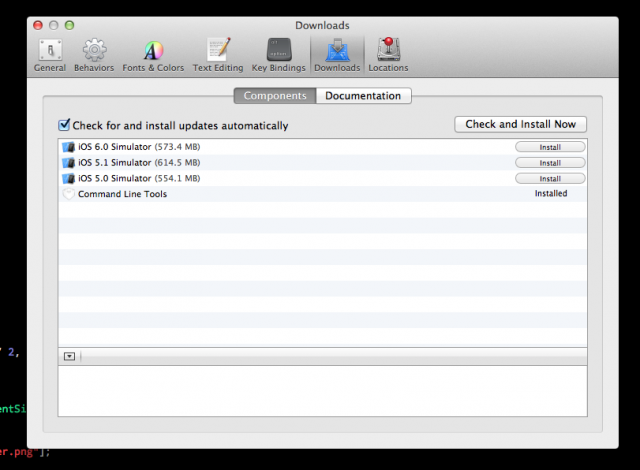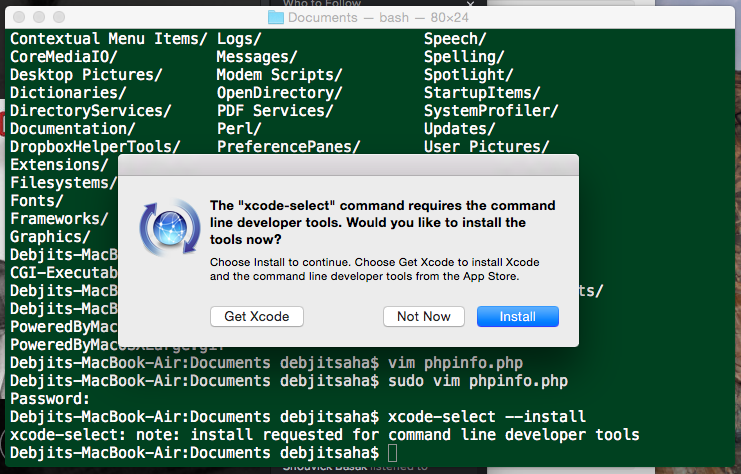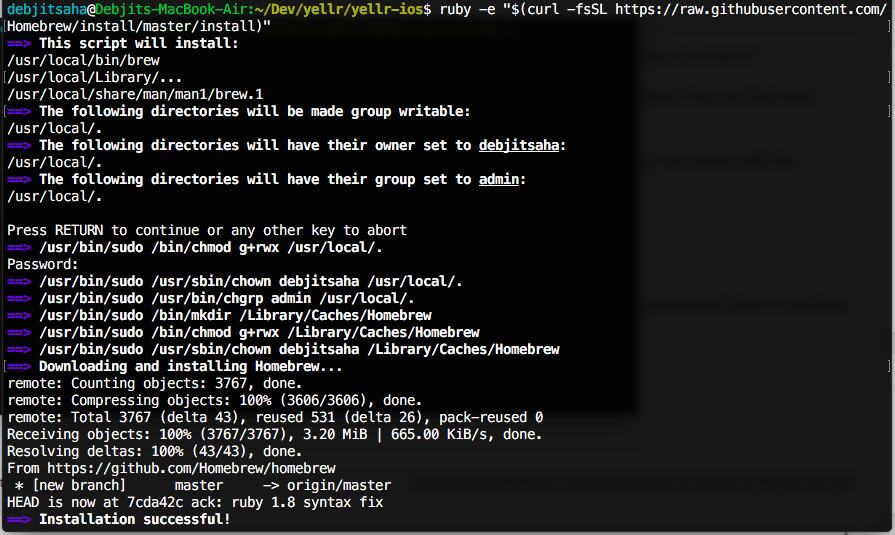Brew Install Xcode Mac
If you do not know what XCode is - go for this one. Run port install pspp-devel to get the latest and most featureful version of PSPP or port install pspp to get an older but possibly better tested version (more information). Install homebrew if you don't already have it, then: $ brew install git. Apple ships a binary package of Git with Xcode. Binary installer. Tim Harper provides an installer for Git. The latest version is 2.31.0, which was released 8 days ago, on 2021-03-16. Building from Source. Xcode is the tool developers use to build apps for the Apple ecosystem – MacOS, iOS, and all things Apple. This guide will walk you through how to successfully install Xcode onto your Mac, from start to finish. Here are some handy tips to know before you get started: Xcode only runs on a mac. If you are on a PC, sadly you won't be able to use. Using the MongoDB Database Tools¶. Starting in MongoDB 4.4.1, installing MongoDB via brew also installs the MongoDB Database Tools. The MongoDB Database Tools are a collection of command-line utilities for working with a MongoDB deployment, including data backup and import/export tools like mongoimport and mongodump as well as monitoring tools like mongotop. # Lotus: install and setup. This guide covers how to install the Lotus applications and launch a Lotus Node. This guide covers installing lotus, lotus-miner and lotus-worker to your computer, and then runs through setting up a Lotus node. For information on running the miner, check the Lotus Miner documentation. # Minimal requirements.
When configuring, the following flags can be used and combined to adjust the suite to your choosing:

- with-airpcap=DIR: needed for supporting airpcap devices on windows (cygwin or msys2 only) Replace DIR above with the absolute location to the root of the extracted source code from the Airpcap CD or downloaded SDK available online. Required on Windows to build besside-ng, besside-ng-crawler, easside-ng, tkiptun-ng and wesside-ng when building experimental tools. The developer pack (Compatible with version 4.1.1 and 4.1.3) can be downloaded at https://support.riverbed.com/content/support/software/steelcentral-npm/airpcap.html

- with-experimental: needed to compile tkiptun-ng, easside-ng, buddy-ng, buddy-ng-crawler, airventriloquist and wesside-ng. libpcap development package is also required to compile most of the tools. If not present, not all experimental tools will be built. On Cygwin, libpcap is not present and the Airpcap SDK replaces it. See –with-airpcap option above. On debian based distro, install libpcap-dev
- with-ext-scripts: needed to build airoscript-ng, versuck-ng, airgraph-ng and airdrop-ng. Note: Each script has its own dependencies. Note: It's only required in install phase.
- with-gcrypt: Use libgcrypt crypto library instead of the default OpenSSL. And also use internal fast sha1 implementation (borrowed from GIT) Dependency (Debian): libgcrypt20-dev
- with-duma: Compile with DUMA support. DUMA is a library to detect buffer overruns and under-runs. Dependencies (debian): duma
- with-xcode: Set this flag to true to compile on OS X with Xcode 7+.
- disable-libnl: Set-up the project to be compiled without libnl (1 or 3). Linux option only.
- without-opt: Do not enable stack protector (on GCC 4.9 and above).
- disable-shared: When combined with enable-static, it will statically compile Aircrack-ng.
- with-avx512: On x86, add support for AVX512 instructions in aircrack-ng. Only use it when the current CPU supports AVX512.

- with-static-simd=: Compile a single optimization in aircrack-ng binary. Useful when compiling statically and/or for space-constrained devices. Valid SIMD options: x86-sse2, x86-avx, x86-avx2, x86-avx512, ppc-altivec, ppc-power8, arm-neon, arm-asimd. Must be used with –enable-static –disable-shared. When using those 2 options, the default is to compile the generic optimization in the binary. –with-static-simd merely allows to choose another one.
Obtaining GNU PSPP
PSPP is GNU software. You can obtain it the same way as with anyGNU software. PSPP should work on most modern computers and most operatingsystems. Systems which have been known to work include:GNU/Hurd,GNU/Linux,Darwin (Mac OS X), OpenBSD,NetBSD, FreeBSD, and Windows.
Binaries
GNU Linux
We do not distribute precompiled binaries of PSPP. Computers come with so many different archtectures, kernels, operating systems that it would not be feasible for us to do so. However most modern operating systems come with PSPP pre-packaged. To install it, you simply type apt-get install pspp in the case of Debian derived systems; or yum install pspp in the case of Red Hat derived systems.
Windows
For PSPP versions prior to October 2020, Harry Thijssen provides installers or all downloadable files. The windows version is build as cross compile build on openSUSE. There is also a nightly build with development versions.
MacOS
There are three ways to install PSPP on MacOS.
Brew Install Xcode Mac Os
- The Application bundle provides the gui version via a normal installer. If you do not know what XCode is - go for this one.
- MacPorts. Run
port install pspp-develto get the latest and most featureful version of PSPP orport install psppto get an older but possibly better tested version (more information). - Homebrew. The PSPP brew tap also includes a description how to install the stable or the development version of PSPP.

Please note: Because the PSPP developers have not prepared these binaries, we cannot in general vouch for them.
Source
Brew Install Xcode Command Line Tools
If you want to compile and install PSPP yourself, you can get the source code fromhttp://ftpmirror.gnu.org/pspp.Should this link be unavailable or unreasonably slow, please select a local mirror site.Once you have downloaded the tarball, refer to the INSTALLfile for installation instructions.
Development Versions
PSPP is under continual improvement. You can get development versions if you are interested to see what the developers are working on. Development versions have undergone less testing than released versions.
You can fetch the latest development sources fromthe Savannah GITrepository.The installationprocedure is more complex than for released versions, so werecommend this only for developers.
Automated builds of the developmentversions are performed typically every day.
